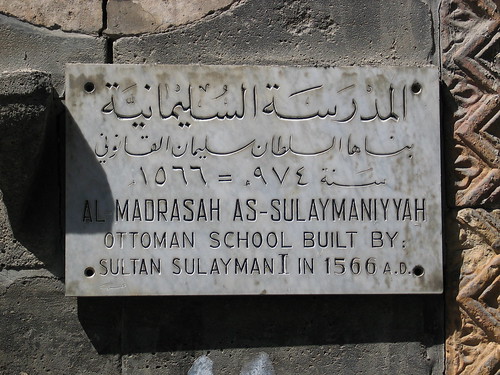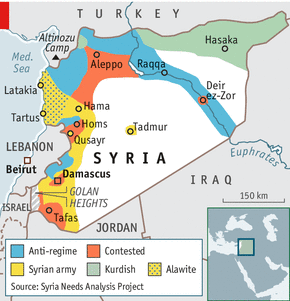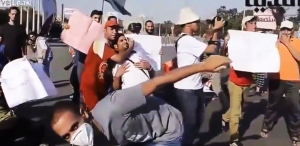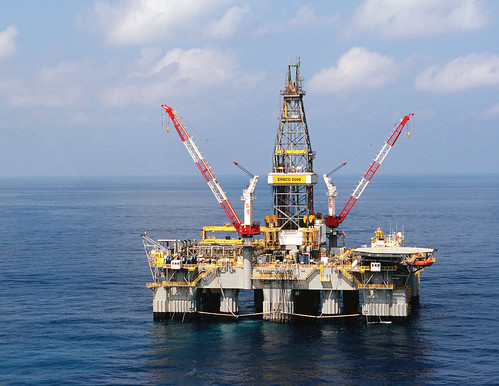”What
are some irrelevant Syrian lives in the grand scheme of things, when
the status quo's wealth must be preserved at all costs.” (Opinion in web forums)
 The
Syrian opposition on has accused the government of launching a chemical
weapons attack in the Damascus suburbs that killed large numbers of
civilians as they slept and packed makeshift hospitals with hundreds of
victims convulsing and gasping for breath. Photographs and videos
posted online showed the bodies of men, women and children, many
appearing to be dead, without visible wounds. Varying opposition claims
put the death toll in the hundreds, with some saying it was more than a
thousand.
The
Syrian opposition on has accused the government of launching a chemical
weapons attack in the Damascus suburbs that killed large numbers of
civilians as they slept and packed makeshift hospitals with hundreds of
victims convulsing and gasping for breath. Photographs and videos
posted online showed the bodies of men, women and children, many
appearing to be dead, without visible wounds. Varying opposition claims
put the death toll in the hundreds, with some saying it was more than a
thousand.
While the public is shocked about news the Pentagon is making the initial preparations for a Cruise missile attack to punish Al-Assad regime. So has the "free and democratic world" forgotten the Iraq WMD disinformation campaign? In my opinion they should think twice as the right address might be Qatar-funded mercenaries led by Al Qaeda.
MediawarMost people think the horrendous news they watch on TV, read in the newspapers or hear on the radio is real. It is not as the question is more about media-war than neutral unbiased newscast.
One should again remember that in the Middle East there is a medi-awar ongoing. Some examples from recent shows:
a) The shooting session of the fake photos in Egypt: A part of film can be seen also via this link or this youtube
b) Video of MB sit-in where the dead bodies
in their coffin wrappings were being dragged out of the ice tanks to
the center of the sit-in, minutes before the Police raid:
c) Picture
supposed to show a victim of 'the gas attack' in Damascus. The picture
has also been used to show a victim of an attack in Egypt as well to
show a victim of an attack in Palestine.
d) Related to Syria it was the rebels who use chemical weapons and Jihadists, not Assad, apparently behind reported chemical attack in Syria.
There
is a tendency for the concept to be invoked in the heat of action,
giving the appearance of propriety for Western television viewers, but
that it neglects the conflicts that are forgotten by the media or occur
based on chronic distresses than sudden crises. For example the US launched two military campaigns against Serbia while ignoring real and more widespread slaughter in Rwanda .
Old practice new theatre
The
pattern of U.S. collaboration with Muslim fundamentalists against more
secular enemies is not new. In the 1980s Washington’s secret services
had assisted Saddam Hussein in his war against Iran. Then, in 1990, the
US fought him in the Gulf. n both Afghanistan and the Gulf, the Pentagon
had incurred debts to Islamist groups and their Middle Eastern
sponsors. By 93 these groups, many supported by Iran and Saudi Arabia,
were anxious to help Bosnian Muslims fighting in the former Yugoslavia
and called in their debts with the Americans. Bill Clinton and the
Pentagon were keen to be seen as creditworthy and repaid in the form of
an Iran-Contra style operation – in flagrant violation of the UN
Security Council arms embargo against all combatants in the former
Yugoslavia. One could add that Ayman al-Zawahiri, later the leader of al
Qaeda, came to America to raise funds in Silicon Valley for Bosnian
jihadists.in 1993, Mr. bin Laden had appointed Sheik Ayman Al-Zawahiri,
to direct his operations in the Balkans.

- Image shows a M60 recoilless gun (YU) being used to attack an army outpost,Hajez Barad, in Busr al-Harir, Daraa, on March 2nd.
Unfortunately, history is repeating. From
my point of view it remains to see if this newest U.S. clandestine
recycling operation has better success that earlier in Balkans,
Afghanistan, Iraq, Libya … I doubt. More in U.S. Recycles Its Old Balkan Practice With Syria .
Only bad options
”We can do this with no boots on the ground, from stand-off distances” (US dream)
Chairman of the US Joint
Chiefs Martin Dempsey, may have made the case. In a letter to
Congressman Elliot Engel, Dempsey said the American military is clearly
capable of taking out the Syrian air force. He wouldn't do it because it
would "offer no strategy for peace," he wrote. "is a deeply rooted,
long-term conflict among multiple factions, and violent struggles for
power will continue after Assad's rule ends. We should evaluate the
effectiveness of limited military options in this context." (Source: American Thinker )
Centcom’s
Forward Command in Jordan is manned by 273 US officers. This
underground facility near Amman is linked to US, Israel, Jordanian and
Saudi Air Force commands ready for an order from President Barack Obama
to impose planned air-strike as well a partial no-fly zone over Syria.
There are today some 1,000 US military personnel in the Hashemite
Kingdom, plus a squadron of F-16 fighters and several Patriot
anti-missile batteries strung along the Jordanian-Syrian border to
shield Jordanian and American bases and the capital, Amman. Obama’s
final decision on a no fly and a buffer zone in Syria is expected in the
coming two to three weeks.

- Syria, cradle of civilizations, compared e.g. with US
Anyway
if USA decides to bomb Syria wouldn't the right address be Qatar-funded
mercenaries led by Al Qaeda instead of the Assad regime.
Russia as a peacemaker?While Obama/US is now in the corner with his ”red lines” Russia has became more reliable player in the Middle East as it is emerging:
● as a vocal defender of Christianity against Muslim persecution around the world;
● as a plausible peacemaker in the Middle East, with far better relationships with Israel, Saudi Arabia, Egypt, and Syria than America has today;
● as the monopoly natural gas supplier for Germany, with the consent of the Franco-German axis;
● as the only country with a credible a nuclear umbrella to protect its friends and deter its enemies;
To show Russia's seriousness in the Middle East, President Putin has paid personal visits and kept contacts with all the players, including the Sisi regime in Egypt, Israel, Syria's Assad, and Saudi Arabia.
Who has smoking gun?
"It
would be very peculiar if it was the government to do this at the exact
moment the international inspectors come into the country"(WMD inspector Rolf Ekeus)
Syrian President Bashar al Assad has now survived two years of civil war, and indeed he is even winning it.Only foreign intervention especially by the United States could defeat him. If so why he would do the one thing Obama said would trigger US action? Since
both sides have been highlighting atrocities carried out by the other
to garner support from outside Syria, it is not beyond the bounds of
possibility that some unscrupulous rebel faction could have launched a
so-called ‘false flag’ operation to discredit the regime even further. At the moment, it is difficult to see what desperate situation would have caused al Assad to use chemical weapons and risk the worst. His opponents however have the motivation - using chemical weapons to force the United States to intervene and depose al Assad. It might be possible that lower-ranking officers in al Assad's military used chemical weapons without his knowledge and perhaps against his wishes. While all options are open what happened in relation of chemical weapons from my perspective it is crucial to wait untill we know more, for example after investigations made by U.N team.
Dissolution of Syria
In normal cases
the United States and its coalition partners, are using humanitarian
pretexts to pursue otherwise unacceptable geopolitical goals and to
evade the non-intervention norm and legal prohibitions on the use of
international force. This
false pretented humanitarianism has become a legitimizing ideology for
projection of U.S. hegemony in a post–Cold War world. For example NATO intervention in Kosovo was conducted largely to boost NATO's credibility. With
case of Syria US doesn't have big geopolitical interests to go war, the
main cause might be that Obama draw his red line – use of chemical
weapon – and he now have to act on the red line principle or be shown to
be one who bluffs. If Obama doesn't act this would show US weakness.
Despite
how US acts one should notice that there is already lot of foreign
intervention in Syria: Russia, Hizbollah etc are giving weapons and
support to al Assad regime; US, Saudis etc are giving weapons to sc
freedom fighters; Qatar etc are financing al Qaeda's fighters and Kurds
get support e.g from Iraq. US might launch its air-strike but bottom
line is that foreign fighters have already their boots on the ground. The Israelis
are privately reluctant supporters of the al-Assad regime. It is a
known quantity, with whom negotiation within established parameters is
possible. The alternative, of divided Sunni Islamist politics presenting
a potentially existential danger to the Jewish state and the region as a
whole, is all the more destabilising. EU is bystander as usual however ready to throw their money in when dirty job is done.

- Balkanization of Syria
In my opinion the majority of the people of Syria are calling out for peace and reconciliation and a political solution to the crisis. The
probable short term result will be dissolution of Syria – some kind of
new balkanization or Somalization as it already happened in Iraq. The country might fragment, as Kurds and Alawites form their own mini-states. The positive outcome might be that second piece-
after North Iraq – of Kurdistan will be established while it remains to
see when regions from Iran and Turkey will join to this long-felt need.


 T
T

 Earlier
Egypt’s natural gas sector has expanded rapidly, with production
quadrupling between 1998 and 2011. Egypt’s proven gas reserves were
estimated at 2.2 tcm in 2011, representing the third-largest reserves in
Africa after Nigeria and Algeria. In 2010, Egypt produced roughly 61.3
bcm of natural gas, of which 45.1 bcm was consumed domestically. In
2010, Egypt exported 15.1 bcm of natural gas (of which 9.71 bcm was via
LNG and 5.46 bcm via pipeline). Egypt’s proven crude oil and condensate
reserves are estimated at 4.5 billion barrels.
Earlier
Egypt’s natural gas sector has expanded rapidly, with production
quadrupling between 1998 and 2011. Egypt’s proven gas reserves were
estimated at 2.2 tcm in 2011, representing the third-largest reserves in
Africa after Nigeria and Algeria. In 2010, Egypt produced roughly 61.3
bcm of natural gas, of which 45.1 bcm was consumed domestically. In
2010, Egypt exported 15.1 bcm of natural gas (of which 9.71 bcm was via
LNG and 5.46 bcm via pipeline). Egypt’s proven crude oil and condensate
reserves are estimated at 4.5 billion barrels. 
 T
T While
military strike still is a serious thread the secret war between Israel
and Iran has been going on the whole time. From Israeli side well known
actions are assassinations of some key figures in Iran’s nuclear
program, Stuxnet and some strange blasts and explosions in Iran’s
nuclear facilities. However its pleasure to find out that some civil
activities will give hope that a non military development might be
possible.
While
military strike still is a serious thread the secret war between Israel
and Iran has been going on the whole time. From Israeli side well known
actions are assassinations of some key figures in Iran’s nuclear
program, Stuxnet and some strange blasts and explosions in Iran’s
nuclear facilities. However its pleasure to find out that some civil
activities will give hope that a non military development might be
possible. 